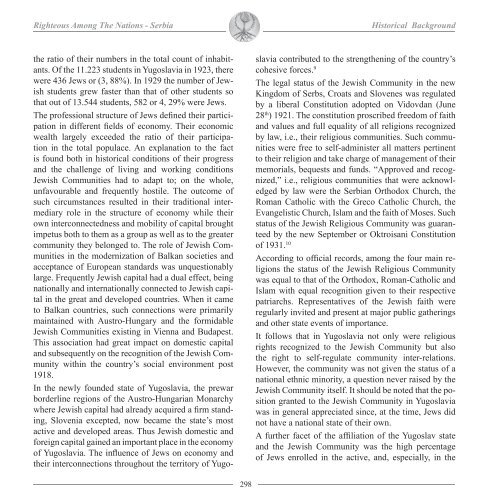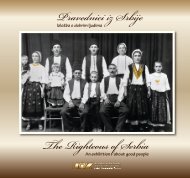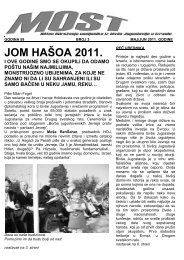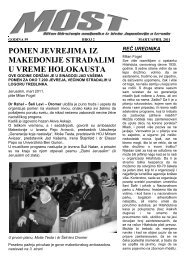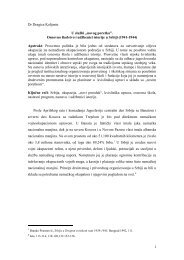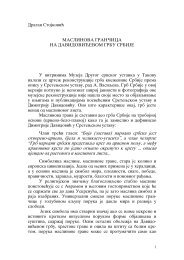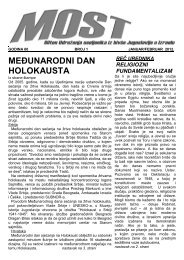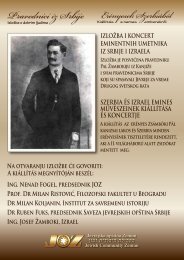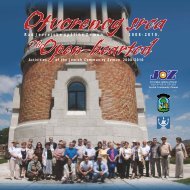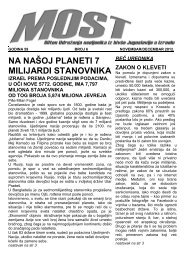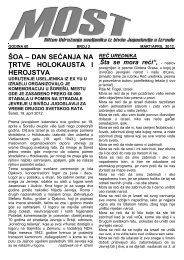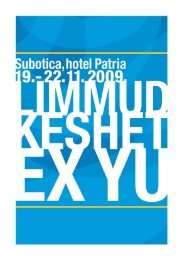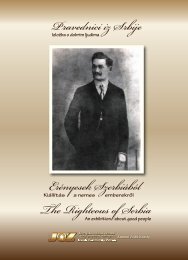Book on the Righteous - Jevrejska opština Zemun
Book on the Righteous - Jevrejska opština Zemun
Book on the Righteous - Jevrejska opština Zemun
You also want an ePaper? Increase the reach of your titles
YUMPU automatically turns print PDFs into web optimized ePapers that Google loves.
<strong>Righteous</strong> Am<strong>on</strong>g The Nati<strong>on</strong>s - Serbia<br />
Historical Background<br />
<strong>the</strong> ratio of <strong>the</strong>ir numbers in <strong>the</strong> total count of inhabitants.<br />
Of <strong>the</strong> 11.223 students in Yugoslavia in 1923, <strong>the</strong>re<br />
were 436 Jews or (3, 88%). In 1929 <strong>the</strong> number of Jewish<br />
students grew faster than that of o<strong>the</strong>r students so<br />
that out of 13.544 students, 582 or 4, 29% were Jews.<br />
The professi<strong>on</strong>al structure of Jews defined <strong>the</strong>ir participati<strong>on</strong><br />
in different fields of ec<strong>on</strong>omy. Their ec<strong>on</strong>omic<br />
wealth largely exceeded <strong>the</strong> ratio of <strong>the</strong>ir participati<strong>on</strong><br />
in <strong>the</strong> total populace. An explanati<strong>on</strong> to <strong>the</strong> fact<br />
is found both in historical c<strong>on</strong>diti<strong>on</strong>s of <strong>the</strong>ir progress<br />
and <strong>the</strong> challenge of living and working c<strong>on</strong>diti<strong>on</strong>s<br />
Jewish Communities had to adapt to; <strong>on</strong> <strong>the</strong> whole,<br />
unfavourable and frequently hostile. The outcome of<br />
such circumstances resulted in <strong>the</strong>ir traditi<strong>on</strong>al intermediary<br />
role in <strong>the</strong> structure of ec<strong>on</strong>omy while <strong>the</strong>ir<br />
own interc<strong>on</strong>nectedness and mobility of capital brought<br />
impetus both to <strong>the</strong>m as a group as well as to <strong>the</strong> greater<br />
community <strong>the</strong>y bel<strong>on</strong>ged to. The role of Jewish Communities<br />
in <strong>the</strong> modernizati<strong>on</strong> of Balkan societies and<br />
acceptance of European standards was unquesti<strong>on</strong>ably<br />
large. Frequently Jewish capital had a dual effect, being<br />
nati<strong>on</strong>ally and internati<strong>on</strong>ally c<strong>on</strong>nected to Jewish capital<br />
in <strong>the</strong> great and developed countries. When it came<br />
to Balkan countries, such c<strong>on</strong>necti<strong>on</strong>s were primarily<br />
maintained with Austro-Hungary and <strong>the</strong> formidable<br />
Jewish Communities existing in Vienna and Budapest.<br />
This associati<strong>on</strong> had great impact <strong>on</strong> domestic capital<br />
and subsequently <strong>on</strong> <strong>the</strong> recogniti<strong>on</strong> of <strong>the</strong> Jewish Community<br />
within <strong>the</strong> country’s social envir<strong>on</strong>ment post<br />
1918.<br />
In <strong>the</strong> newly founded state of Yugoslavia, <strong>the</strong> prewar<br />
borderline regi<strong>on</strong>s of <strong>the</strong> Austro-Hungarian M<strong>on</strong>archy<br />
where Jewish capital had already acquired a firm standing,<br />
Slovenia excepted, now became <strong>the</strong> state’s most<br />
active and developed areas. Thus Jewish domestic and<br />
foreign capital gained an important place in <strong>the</strong> ec<strong>on</strong>omy<br />
of Yugoslavia. The influence of Jews <strong>on</strong> ec<strong>on</strong>omy and<br />
<strong>the</strong>ir interc<strong>on</strong>necti<strong>on</strong>s throughout <strong>the</strong> territory of Yugo-<br />
slavia c<strong>on</strong>tributed to <strong>the</strong> streng<strong>the</strong>ning of <strong>the</strong> country’s<br />
cohesive forces. 9<br />
The legal status of <strong>the</strong> Jewish Community in <strong>the</strong> new<br />
Kingdom of Serbs, Croats and Slovenes was regulated<br />
by a liberal C<strong>on</strong>stituti<strong>on</strong> adopted <strong>on</strong> Vidovdan (June<br />
28 th ) 1921. The c<strong>on</strong>stituti<strong>on</strong> proscribed freedom of faith<br />
and values and full equality of all religi<strong>on</strong>s recognized<br />
by law, i.e., <strong>the</strong>ir religious communities. Such communities<br />
were free to self-administer all matters pertinent<br />
to <strong>the</strong>ir religi<strong>on</strong> and take charge of management of <strong>the</strong>ir<br />
memorials, bequests and funds. “Approved and recognized,”<br />
i.e., religious communities that were acknowledged<br />
by law were <strong>the</strong> Serbian Orthodox Church, <strong>the</strong><br />
Roman Catholic with <strong>the</strong> Greco Catholic Church, <strong>the</strong><br />
Evangelistic Church, Islam and <strong>the</strong> faith of Moses. Such<br />
status of <strong>the</strong> Jewish Religious Community was guaranteed<br />
by <strong>the</strong> new September or Oktroisani C<strong>on</strong>stituti<strong>on</strong><br />
of 1931. 10<br />
According to official records, am<strong>on</strong>g <strong>the</strong> four main religi<strong>on</strong>s<br />
<strong>the</strong> status of <strong>the</strong> Jewish Religious Community<br />
was equal to that of <strong>the</strong> Orthodox, Roman-Catholic and<br />
Islam with equal recogniti<strong>on</strong> given to <strong>the</strong>ir respective<br />
patriarchs. Representatives of <strong>the</strong> Jewish faith were<br />
regularly invited and present at major public ga<strong>the</strong>rings<br />
and o<strong>the</strong>r state events of importance.<br />
It follows that in Yugoslavia not <strong>on</strong>ly were religious<br />
rights recognized to <strong>the</strong> Jewish Community but also<br />
<strong>the</strong> right to self-regulate community inter-relati<strong>on</strong>s.<br />
However, <strong>the</strong> community was not given <strong>the</strong> status of a<br />
nati<strong>on</strong>al ethnic minority, a questi<strong>on</strong> never raised by <strong>the</strong><br />
Jewish Community itself. It should be noted that <strong>the</strong> positi<strong>on</strong><br />
granted to <strong>the</strong> Jewish Community in Yugoslavia<br />
was in general appreciated since, at <strong>the</strong> time, Jews did<br />
not have a nati<strong>on</strong>al state of <strong>the</strong>ir own.<br />
A fur<strong>the</strong>r facet of <strong>the</strong> affiliati<strong>on</strong> of <strong>the</strong> Yugoslav state<br />
and <strong>the</strong> Jewish Community was <strong>the</strong> high percentage<br />
of Jews enrolled in <strong>the</strong> active, and, especially, in <strong>the</strong><br />
298


